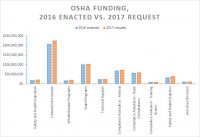OSHA Requests Budget Increase of $42 Million for FY 2017
OSHA’s budget request for fiscal year (FY) 2017 includes a $42 million increase over 2016 levels and 100 additional full-time staff. Keep reading to learn how OSHA plans to use the additional funding and what it could mean for your facility.









